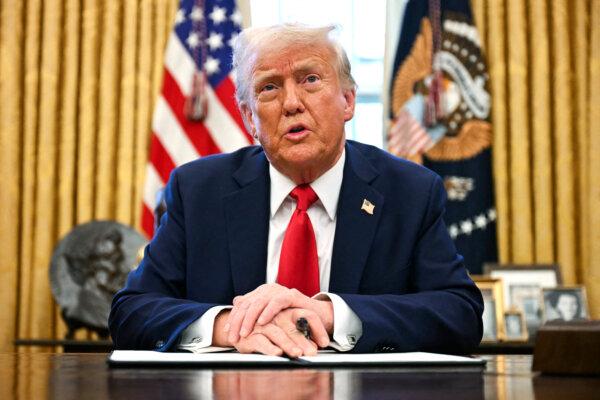UK Faces Minimal Economic Impact From US Tariffs, Analysis Finds
Downing Street maintains that trade relations with the United States are ‘fair and balanced,’ while Starmer said he trusts Trump to agree to a deal.
Economists suggest that the UK is less exposed to U.S. import tariffs than many other countries, with any resulting economic impact expected to be minimal.
The United States administration under President Donald Trump is focused on reducing the national trade deficit and raising spending and employment. Countries contributing to the U.S. trade deficit, including Canada, Mexico, and China, are at risk of sweeping new tariffs to their exports to the United States.
Analysis by Capital Economics suggests that Britain is not “in the firing line,” given the broadly balanced trade in goods with the United States. In 12 months to July 2024, this stood at $10 billion in U.S. surplus. In services, the UK ran a trade surplus with the United States in services worth £69 billion in 2023.
“Trump’s desire to boost America’s industrial rust belt means he’s focused on goods. As a result, it seems likely that services will be exempt from U.S. tariffs,” said Capital Economics in a recent economic report.
When asked if he will target the UK with tariffs, Trump said on Monday that Britain is “out of line” but added “it can be worked out.”
He has also said that discussions with Prime Minister Sir Keir Starmer had “been very nice” and the two leaders “are getting along very well.”
Meanwhile, Downing Street insists the trading relationship with the United States is “fair and balanced” and Starmer trusts Trump to keep his word regarding a deal.
Impact on UK Economy
The UK may be out of the bull’s eye for now, but speculation over which sectors of the economy would be affected by U.S. tariffs is ongoing. Economists caution that the UK’s car, pharmaceutical, and machinery sectors would be among the worst hit.
In 2023, pharmaceuticals accounted for 14.5 percent of UK goods exports to the United States; cars and power generation machinery slightly above 10 percent; while industrial machinery stood at 6.4 percent. Meanwhile, the UK runs trade surpluses in both pharmaceuticals and cars.
Analysis also suggests that impact on the UK is likely to remain limited, including on exports of aluminium, iron, and steel.
If imposed, higher U.S. tariffs could weaken the British pound by 10–15 percent. The measure would also raise UK import costs, pushing up prices and disrupting supply chains, according to the National Institute of Economic and Social Research (NIESR).
A “blanket tariff” would increase costs for raw materials and goods, affecting industries that depend on global supply chains, economist Ahmet Ihsan Kaya said.
“For instance, if Chinese chips become more expensive due to tariffs, the price of U.S. circuits used in cars manufactured in the United Kingdom would also rise,” he added.
Another concern is the impact of rising costs on wages and inflation. NIESR estimates that U.S. import tariffs could add around three percentage points to UK inflation, undermining government efforts to control price increases, which have reached record highs and remained stubbornly high in recent years.

U.S. President Donald Trump speaks to the press as he signs an executive order to create a U.S. sovereign wealth fund, in the Oval Office of the White House in Washington on Feb, 3, 2025. Jim Watson/AFP
Balancing Act
The UK government wants to maintain a “strong trading relationship” with the United States, but is also keen to foster closer links with the European Union.
Speaking at a press conference in Brussels on Monday alongside NATO Secretary General Mark Rutte, Starmer said: “It’s really important that we work with both and we don’t see it as an either-or. It is in the best interests of the UK, but also the best interest I think in terms of global security and defence, that we continue to work both with the U.S. and with Europe on these vital issues.”
His comments came after Trump threatened to impose tariffs on EU imports.
After Brexit, the UK has the freedom to set its own trade policies. However, the government must carefully consider that the EU remains Britain’s largest trading partner when making decisions that could either distance the UK further from the EU or align it with EU trade policies.
As a single bloc, the EU accounted for 41 percent of UK exports and 51 percent of imports in 2023. Trade dependence on the EU restricts the scope of the UK to act independently, the Resolution Foundation said.
“But the bigger risk for Britain is that an escalating series of tariffs and retaliatory measures trigger a full-blown trade war, weakening global demand for UK exports,” it added.
Analysis by Capital Economics suggests that Britain is likely to retaliate to U.S. tariffs in a similar way to the EU, “on a smaller, more targeted scale so as to not escalate the situation.” At the same time, the UK is expected to stay clear of oil and gas, which together account for 32 percent of all goods imports from the United States.
To mitigate the negative effects of tariffs, the UK government could consider pursuing a trade deal with Washington, according to NIESR.
However, Capital Economics views this as an unlikely option owing to U.S.–UK disagreements over food standards and lack of “appetite” in the U.S. Congress for “trade deals of any sort.”
“The new Trump presidency is particularly delicate for the UK. The government will need to, on the one hand, offer an olive branch by signalling appetite for an ambitious trade deal, while at the same time strengthening the UK’s trade defences to brace for a potential tariff war,” the IPPR report said.
PA contributed to this report.





